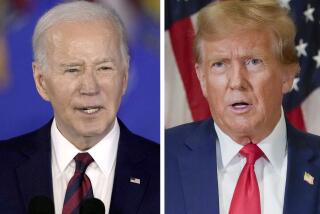There’s No Easy Way for Kerry to Repay Campaign Bank Loan
WASHINGTON — Sometime in the next month, Sen. John F. Kerry will face a tough financial question: How and when should he pay back the $6.4-million bank loan he funneled into his campaign late last year, when he was struggling for cash?
Under the new campaign finance law, Kerry can draw on campaign funds to repay the loan, which was secured by a house he owns in Boston with his wealthy wife, Teresa Heinz Kerry. But Kerry is limited to using money the campaign raises before he is nominated at the four-day Democratic National Convention, which begins on July 26 in Boston.
If he goes that route, the campaign will have $6.4 million less to spend on advertising. And the loss of that money will come at a time when President Bush has a five-week advantage over Kerry to raise and spend campaign donations.
Presidential candidates can raise private money up until they are nominated at their party’s conventions. The Republican gathering is the end of August, giving Bush extra time to raise campaign cash.
Kerry’s campaign was in desperate political and financial shape in late December when he took out the loan. But, aided by the money and other factors, a month later he surged to victory in the Iowa caucuses, the first contest in the Democratic presidential race. He then effectively secured the party’s nomination in early March.
Since his Iowa victory, his fundraising fortunes have soared. He had collected $148 million by the end of May, the most ever by a nonincumbent presidential candidate, and had nearly $28 million in cash. His campaign has continued raising large amounts of money, including $5 million last week at a Los Angeles benefit concert. Another concert is scheduled for next week at Radio City Music Hall in New York.
If Kerry is going to use campaign money to repay the loan, he must do so within 20 days after the convention. Otherwise, he has to use his own money, save for $250,000.
But his financial disclosure forms indicate he doesn’t have enough personal assets to repay the entire loan by himself. And his $154,700-a-year Senate salary would appear to make it difficult for him to make the $16,600 monthly interest payments now being paid by the campaign.
Despite his wife’s wealth -- a recent study by The Times estimated she was worth at least $1 billion -- she can’t help repay the loan because that would be considered an illegal campaign contribution.
“Sen. Kerry has not made a final decision on this,” said Michael Meehan, a senior campaign advisor. “As of now, the loan has not been repaid.”
Michael Toner, a Federal Election commissioner and Republican, referred to Kerry’s dilemma as “the $6-million question of the presidential election.”
Toner noted that before passage of the McCain-Feingold campaign finance legislation in 2002, candidates were able to continue raising funds to repay loans to their campaigns for years. “Sen. Kerry is the first federal candidate to really confront this new restriction,” he said.
One campaign fundraiser, who spoke on condition of anonymity, said he thought some donors would be upset to learn their money went to repay Kerry’s loan. “I don’t think people have focused in on that,” he said.
But Larry Noble, executive director of the Center for Responsive Politics in Washington, which tracks political donations, said he thought that Kerry would choose to repay the loan from his campaign, rather than face questions about how he would repay it down the road.
“The bigger problem is if he doesn’t pay off the loan and carries it forever,” Noble said. “Then you run into a political problem. The cleanest way to go is announce that the campaign is paying it off.”
More to Read
Get the L.A. Times Politics newsletter
Deeply reported insights into legislation, politics and policy from Sacramento, Washington and beyond. In your inbox three times per week.
You may occasionally receive promotional content from the Los Angeles Times.










